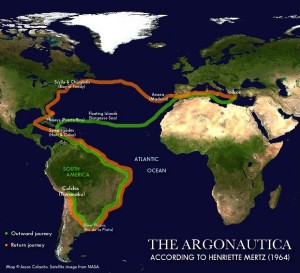Mertz, Henriette
Henriette Mertz (1898-1985) During World War II she worked as a code- breaker in the U.S. government’s cryptography department, while later she became an American patent lawyer in Chicago. Her interest in archaeology led her to be the first[0396][0397] to propose that Odysseus, after wandering about the Atlantic, was the earliest European to set foot in America: an idea now taken up by others including Enrico Mattievich[0400].
breaker in the U.S. government’s cryptography department, while later she became an American patent lawyer in Chicago. Her interest in archaeology led her to be the first[0396][0397] to propose that Odysseus, after wandering about the Atlantic, was the earliest European to set foot in America: an idea now taken up by others including Enrico Mattievich[0400].
Mertz recognised that ancient America was host to guests if not residents from both east and west and has written in Pale Ink[0398] on the evidence for the existence of persistent pre-Columbian Chinese contacts. This book was later re-published as a paperback and retitled Gods from the Far East.
Her book The Mystic Symbol[0621] argues that some early Christians fled to America to escape persecution in the Roman Empire. Wayne N. May, the Mormon publisher of Ancient American, has also published a paper on the Mystic Symbol(b).
In a paper reprinted in the Ancient America website, Mertz decried the fact that thousands of inscribed artefacts recovered from mounds in the State of Michigan, between 1890 and 1920, were destroyed, in particular the controversial Newberry Tablet(c).
Her reputation as a serial heretic also forced her to privately publish a volume on Atlantis[0399] following rejection by twenty publishers. She gave a lecture on her views in London in 1964(d) and enjoyed extensive coverage in the Greek press including the serialisation of her book.
Her contention is that Atlantis was located in the southeast of the United States. She begins with the legend of the Seven Cities of Antillia and its depiction on the 1436 map of Andrea Bianco. A comparison of this map with a modern map of Florida convinced her that they referred to the same region. She discusses many aspects of Plato’s story and their compatibility with the archaeology, geography and legends of her chosen location. She also offers a map of Atlantis that encompasses the land bound by the Mississippi, Ohio and Potomac rivers as well as the Atlantic giving us the ‘island’ of Atlantis. To support this possibility she ingeniously suggests that Plato used the word ‘sea’ in the sense of being navigable and so was also applicable to rivers.
Mertz’s book, Wine Dark Sea, which claims that Homer’s Odyssey describes a  very ancient trip to America, inspired the Austrian ethnologist, Christine Pellech, to expand on her work with a number of books on diffusionism together with a website on the subject. Unfortunately, Pellech’s books are only available in German but she has also established an English language magazine and website(a).>However, Pellech references Mertz’s theory but goes further with her contention that Homer’s Odyssey was a description of an ancient circumnavigation of the globe.(e)<
very ancient trip to America, inspired the Austrian ethnologist, Christine Pellech, to expand on her work with a number of books on diffusionism together with a website on the subject. Unfortunately, Pellech’s books are only available in German but she has also established an English language magazine and website(a).>However, Pellech references Mertz’s theory but goes further with her contention that Homer’s Odyssey was a description of an ancient circumnavigation of the globe.(e)<
(a) https://www.migration-diffusion.info/index.php
(b) https://www.migration-diffusion.info/article.php?id=73
(d) Atlantis, Volume 17, No.6, October 1964.
(e) Dr. Christine Pellech – Atlantisforschung.de (German) (See Archive 7097 mixed English & German) *
